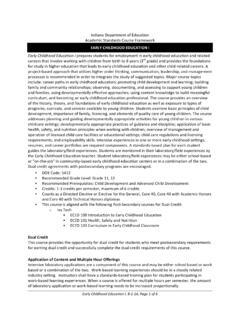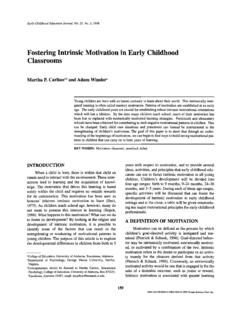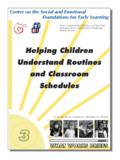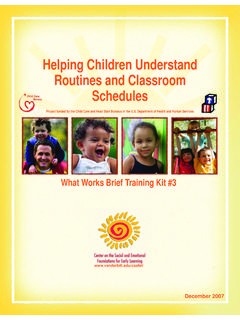Transcription of www.edam.com.tr/estp The Contribution of School-Family ...
1 Educational Sciences: Theory & Practice - Special Issue Autumn 3099-3110 2012 Educational Consultancy and Research study aims to determine the level of the Contribution of School-Family cooperation on effective classroom management in early childhood education, and what should be desired Contribution according to views of pa-rents and teachers. The data was collected qualitatively through semi-structured interview forms in downtown Gaziantep during the during the spring semester of 2011/2012 academic year. The participants of this study are; 28 preschool teachers, and 23 parents of the students of the selected 5 schools with convenience sampling method. Descriptive analysis and content analyses were performed for analyzing the interview results. As the findings of this study showed; most of the teachers think that the parents give them support in all the questioned dimensions except when coping with students misbehaviors.
2 However, some of the teachers and parents think that there are still problematic areas in the School-Family cooperation and various improvements should be made for developing this cooperation. Key WordsSchool-Family Cooperation, classroom management , early childhood Education. Ahmet Cezmi SAVA aZirve UniversityThe Contribution of School-Family Cooperation on Effective classroom management in early childhood Education*Parents play a key role in their children s academic progress and school achievement. Parental support of the child in the home ( , emotional support, helping with homework, assistance with encou-ragement, and educational decisions) influence school success (Peterson et al., 2011). Involvement and participation of parents in schooling has con-sistently been shown to impact children s improve-ment and achievement (Epstein, 1983; Fehrmann, Keith, & Reimers, 1987; Stevenson & Baker, 1987; Lee & Green, 2008).
3 Effective collaboration betwe-en schools and families is a significant factor for improving the children success and the effective-ness of schools (Mortimore, Sammons, Stoll, Le-wis, & Ecob, 1988; Sammons, Hillman, & Morti-more, 1995). In addition, the literature argues that good collaboration between teachers and parents can bring, not only effectiveness, but also improve-ment in other areas of the school, for example, the way a classroom is managed (Angelides, Theopha-nous, & Leigh, 2006). classroom management is one of the most im-portant factors in providing education to students (Evertson & Weinstein, 2006; Wang, Haertel, & Walberg, 1993). Research and common sense cle-arly demonstrated that effective teacher classroom management strategies diminish and avert class-room- disruptive behavior (Hawkins, Catalano, Kosterman, Abbott, & Hill, 1999; Kellam, Ling, Merisca, Brown, & Ialongo, 1998; Walker, Col-* This paper was revised after being presented at the International Conference on Global Issues of early childhood Education and Children s Rights, Gaziantep, Turkey, 27-29 April Ahmet Cezmi SAVA , , is currently a lecturer at Faculty of Edu cation, Zirve University.)
4 His re-search topics organizational psychology, learning schools and emotions of leaders. Correspon-dence: Dr. Ahmet Cezmi SAVA , Zirve University Faculty of Education K z lhisar Campus, 27260, ahinbey/Gaziantep-Turkey. E-mail: Phone: +90 342 211 6666/6792. Fax: +90 342 211 SCIENCES: THEORY & PRACTICE3100vin, & Ramsey, 1995) support student interest in learning (Kunter, Baumert, & Koller, 2007) and improve academic achievement and school wil-lingness (Webster-Stratton & Reid, 2004). On the other hand, ineffective classroom management practices cause to decrease in students motivati-on and increase the students misbehaviors in the classroom (Jones & Jones, 2004). These schools should take immediate action, because effective classroom management form the basis of effective teaching and learning.
5 Administrators, teachers, and parents should be employed in a cooperative effort for effective classroom management . Teac-hers and parents have major roles to play in effec-tively managing students behaviors in classroom (Marzano, 2011).In this sense, to design an effective teaching and le-arning environment, a successful classroom mana-gement and organization comprised of motivating students for achievement, helping students for en-hancing their performance, preventing misbehavi-ors, and solving students social and psychological problems ( elik, 2009; Erdogan et al., 2010). The teacher and parents communication ( , Parents meetings, private conversations, home visits) is very important to motivate students for success and to solve the child s poor behavior (Morgan, 2010).
6 In order to increase the existing rate of school-parent cooperation for effective classro-om management , the schools should initiate more social activities with parents, employing guidance service to increase communication and address expectations and respective needs (Mahasneh et al., 2012). classroom management is still a major weakness a among number of preschools. Preschool class-rooms are complex learning and living environ-ments, because each child feels secure, has a fair chance to learn, and has a sense of belonging (Tal, 2010). In preschool classrooms, some children are eager and insistent when engaging in block buil-ding while others are goal-oriented and focused while working on a puzzle. early childhood teac-hers recognize that children differ not only in what they know and are learning but also in how they manage the classroom throughout the school day (Chen & McNamee, 2011).
7 Because of these dif-ferences preschool teachers use when confronted with classroom management problems school-pa-rent cooperation strategy (Uysal, Altun Akbaba, & Akg n, 2010). early childhood teachers recognize that children differ not only in what they know and are learning but also in how they approach activities througho-ut the school day. In preschool classrooms, some children are enthusiastic and persistent when enga-ging in block building while others are goal-orien-ted and focused while working on a puzzle. Child-ren invariably use different learning approaches in play activities and problem solving article describes the findings of a study, scho-ol-family cooperation on effective classroom ma-nagement in early childhood education, which aimed to provide a comprehensive picture of teac-hers and parents opinions toward School-Family cooperation.
8 Addressing the issues of what s the level of Contribution of School-Family cooperati-on? and what should be the desired contributi-on? the study sought to redress a significant gap in the research literature at the intersection of scho-ol-family cooperation and teachers professional classroom management . The present study seeks to bridge the gap between existing research on scho-ol-family cooperation and classroom management on the early childhood educational system in design of the study was made use of qualita-tive research method. This method provides the researchers to work small groups, but thus to gain in-depth information, understanding and wider insight on the selected subjects (Strauss & Corbin, 1998).ParticipantsWith convenience sampling method, 5 preschools were selected in downtown Gaziantep during the spring semester of 2011/2012 academic year.
9 Tar-get subject of this qualitative study consisted of 30 preschool teachers and 30 parents at these 5 presc-hools. These teachers and parents were offered to interview. 28 teachers (24 females, 4 males) and 23 parents (13 mothers, 10 fathers) accepted to parti-cipate in this study. So the participants of this study are; 28 preschool teachers, and 23 parents of the students of the selected 5 schools. Characteristics of the subjects (teachers and parents) are summa-rized in Table / The Contribution of School-Family Cooperation on Effective classroom 1. Demographic Information of Parents and TeachersTeachers (N=28)Parents (N=23)GenderfGenderfFemale24 Female13 Male4 Male10 Age (years)fAge (years)f30 and below1530 and below231-401131-401141 and above241 and above10 Data Collection InstrumentsIn this study, two different, but parallel semi-struc-tured interview schedules; for teachers and parents, were prepared for the study based on the informal interviews with two faculty staffs of early childho-od education and primary education and also ba-sed on the analysis of the empirical and theoretical literature on classroom management of examining the related literature, five main themes were determined as the areas of School-Family cooperation.
10 There were five main themes in each interview form such as; 1) Coping with students misbehaviors, 2) Solving students so-cial problems, 3) Solving students psychological problems, 4) Motivating students for achievement, and 5) Helping students for enhancing their per-formance. In each main theme, the teachers were asked as; in the matter of ..: A) Do you re-ceive sufficient support from the parents? If so, in which matters do parents cooperate and give sup-port. B) For attaining the desired situation, what can be done and in which areas there is a need for School-Family cooperation? Similarly in each main theme, the parents were asked as; in the matter of .. A) Do you give sufficient support to the teachers? If so, in which matters do you cooperate and give support.



















